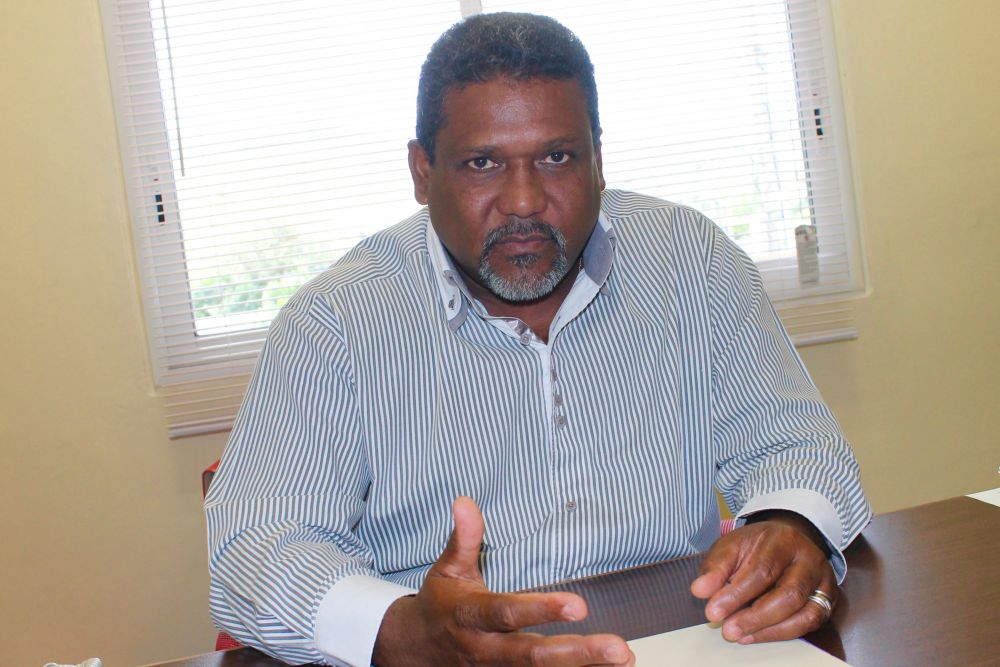Alain Richardson talks with former presidents of the Collectivité
Last month, you spoke about the priority constitutionality issue (QPC) as former president. You also sign your platforms in the media in this way. Why?
I’ll do it more and more often. I shall speak “for the love of Saint-Martin”.
A draft slogan for the forthcoming elections in March 2017?
I don’t know if the word "slogan" is the most appropriate term but it’s indeed with this name that I will speak from now on... I've never hidden my love and my commitment to Saint-Martin and its population, a commitment that is unwavering.
I’m convinced that I can make a significant contribution. This year and those to come will be the founding years for the development of the territory.
What’s essential for the population is to be able to respond to the major challenges of the territory. And so if we want to be effective, we need to go beyond the usual political divisions and our egos if we want to act effectively.
Why haven’t you declared your candidacy? Is it still too early?
Being a candidate or at the top of the list shouldn’t be an end in itself. Today, Saint-Martin needs a leader to meet its challenges. The territory is experiencing difficult years; fights will have to be led, especially against the State in order to get the appropriations to which we are entitled, etc. In light of these issues, I think that it would be inappropriate to say "I'm a candidate. Saying that would not be in the interest of Saint-Martin. The public interest must prevail over ego.
You say that we "need to go beyond political divisions". So, do you intend to forge alliances?
In recent months, I have been reaching out to exchange. I have spoken with Louis-Constant Fleming and Frantz Gumbs. As former presidents of the Collectivité and beyond political affinities, we have this common analysis of the issues for the territory. We have a certain critical perspective. Thanks to this experience, we can better think about the solutions that are needed to respond to the real problems of this territory.
For example, we know that the way in which Saint-Martin has been treated by the State since 2007 is very unfair. The State has not been the partner that it should have been under the constitution and organic law.
The financial resources that were dishonestly cut in 2007 are one of the bottlenecks of the Collectivité. Every year, 12 million euros are missing from the budget.
It’s crucial to understand that rights and freedoms are enshrined in the French constitution, but it’s also a French tradition to fight to ensure that these rights are recognized. We must stop using a standard policy with the State and implement the necessary policies to develop this territory.
Aren’t you afraid that this fight against the State will turn against you or the Collectivité?
It’s our right. The administration is evil in France. The administration has too much power. While remaining within the Republic, and with the support of the organic law, it’s essential to have a firm and clear position.
You often talk about the “issues for the territory”. What are these issues according to you?
Today, Saint-Martin is one of the territories where the priority is managing the young population while elsewhere it’s managing the aging population. This youth should be a real asset, however due to social problems, unemployment, school failure, etc., related to a lack of real policies; it represents a threat to the future of this territory.
In addition, we have a growing population and a very low GDP, the combination of these three elements can be dangerous if we don’t react and act quickly. This can lead to the impoverishment of our society.
What policy do you recommend?
We need ten years to double the gross domestic product (GDP). And it requires economic development, primarily through the development of the private sector. And first of all, the tourism sector. We must increase our hotel and yacht harbor capacity. We have a very strong potential which is not sufficiently exploited.
Secondly, the retail sector must also be boosted, particularly exports and imports. I believe that Saint-Martin must become a hub within the Caribbean. For this, the Galisbay commercial port must be developed; the third phase of development must be implemented. I recommend as I had already done in 2012, the creation of a free zone in Galisbay. In imports-exports, Saint-Martin can really become a major player. As well as in e-commerce and ICTs in general. Saint-Martin must also become a hub for the knowledge industry.
And in social matters, what measures would you take?
Saint-Martin has a huge need for housing. Precisely in the areas affected by the 50 geometric steps. It’s imperative to address this problem. Many files are pending and therefore houses, too. Constructions cannot be completed due to financial problems because people don’t qualify for bank loans, etc. In this dossier, there are the obstacles that need to be overcome.
I also want to fight so the RSMA (Adapted military service regiment) is established in Saint-Martin. I would also like a second-chance school here on the island. Education and training must be priorities. We must provide solutions for this young population, especially since they are suffering.
Today, what is your working method?
As I said earlier, I regularly exchange with the former presidents. Work groups have been set up. I also talk a lot with the population in order to understand their needs and expectations.
And with members of the current majority?
With some of them, yes. But I want to go beyond the current majority. Beyond the RRR. I now believe that the situation requires a wider approach, one that goes beyond divisions.
In 2012, when you were elected at the head of the Collectivité, you took unpopular measures (100€ contribution, etc.). Do you think that this has harmed your popularity?
Yes, maybe. But I think that this especially showed that I had the courage to take the necessary measures, even if they were unpopular. It was necessary to take them at this time. However, I could not show how they could come to fruition.






